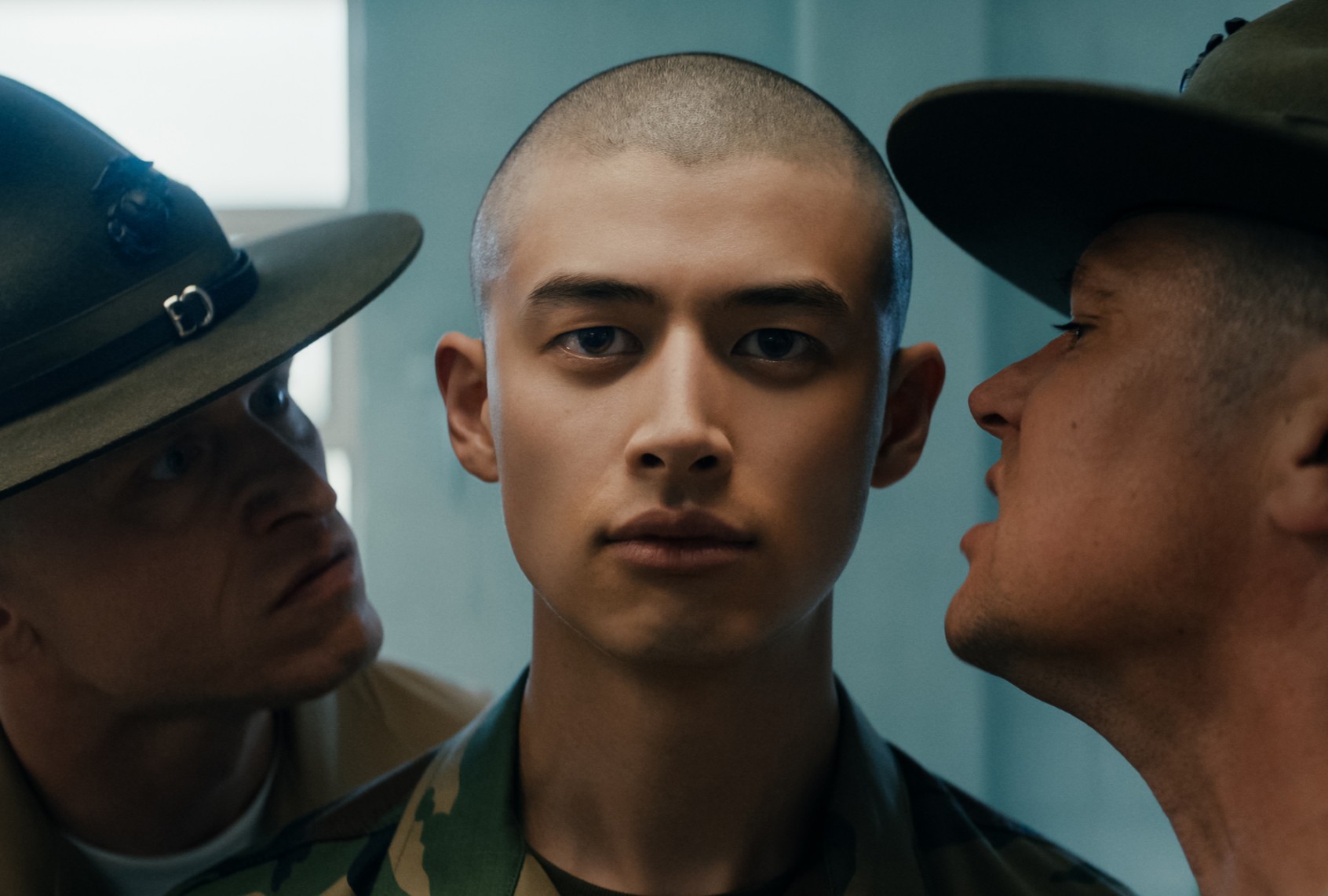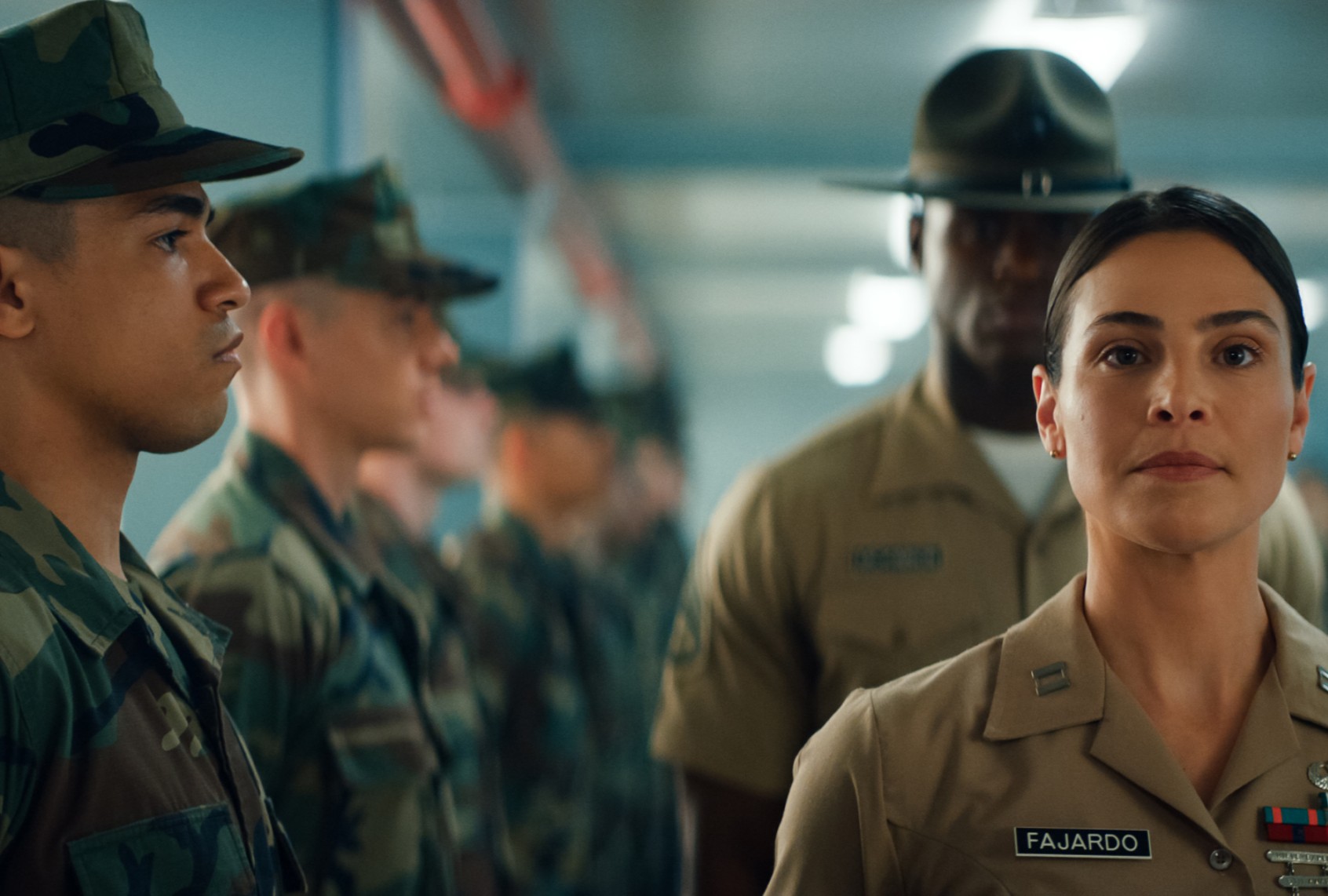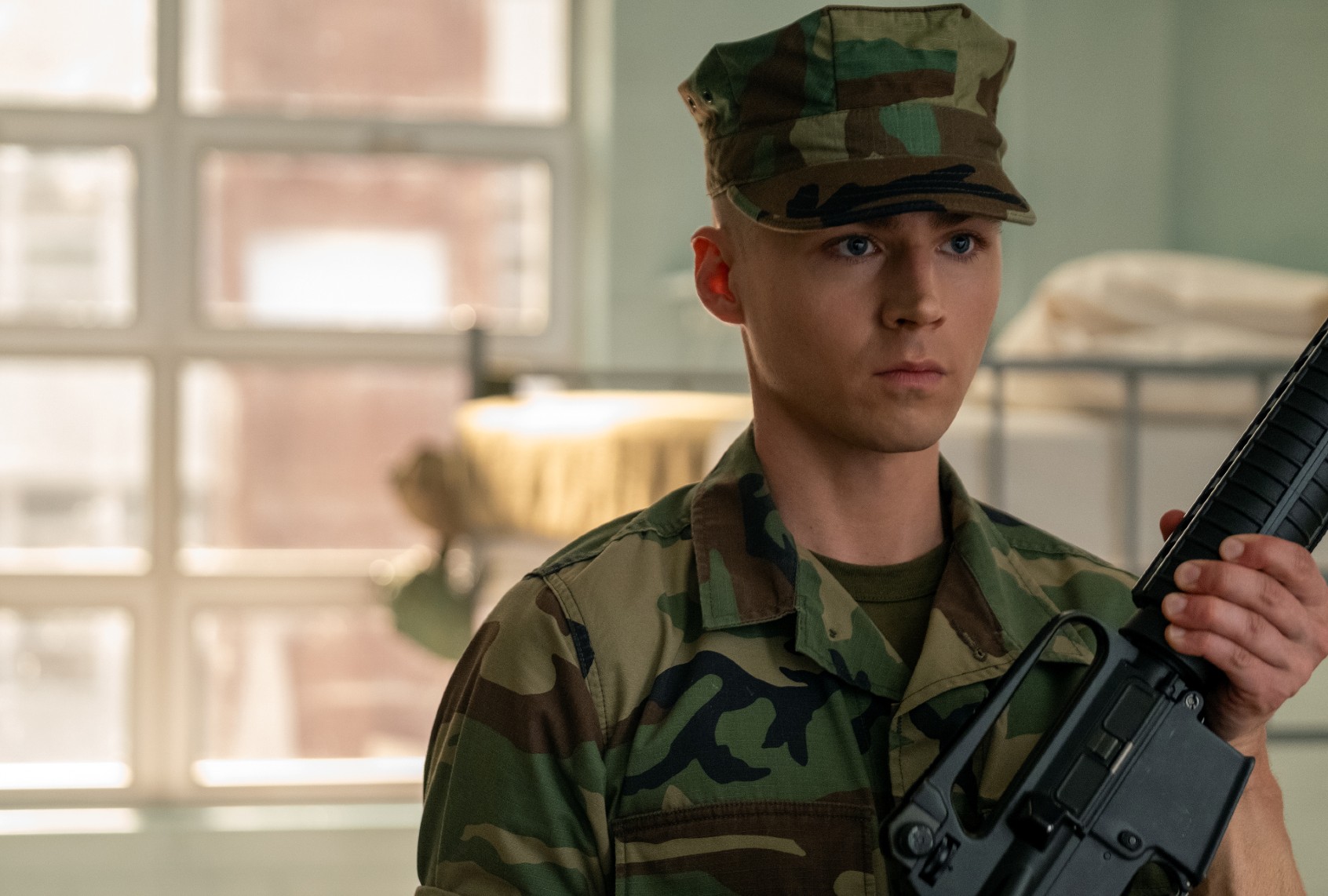[ad_1]
“Boots” begins with best friends Cameron Cope (Miles Heizer, “13 Reasons Why“) and Ray McAffey (Liam Oh) deciding to join the Marines. Soon, the two young men and other recruits find themselves on a bus bound for the Marine Corps Recruit Depot at Parris Island, which Cam mistakenly pictures as a camping excursion. But soon after the transport pulls into the base, the torture begins.
Drill sergeants greet them with abusive screaming before shaving their heads and shoving uniforms into their hands. Cam is appalled at the lack of privacy in the bathrooms. He quickly concludes he’s made a huge mistake, but he’s not alone. The next morning, when the recruits are ordered to shave, one nervously eyes his razor and curses to himself.
“Boots” espouses a determinist philosophy meant to inspire the types of people Hegseth wants to scrub from the U.S. military or bar from serving. In its portrayal, strength isn’t about posturing but an individual hallmark that can be shored up and channeled.
“What’s the matter? You got sensitive skin?” another recruit says tauntingly. But the young man simply replies, “I’ve got my skin.”
Like every other branch of the United States’ armed forces, the Marine Corps has standards that it drills into its personnel, the most key being those that instill the importance of “finding individual purpose in a collective cause.” That quote comes from the Marines’ official website, not the speech Pete Hegseth inflicted on the generals, admirals and senior enlisted personnel he called to Quantico, Virginia, on Sept. 30.
In Hegseth’s “warrior” fantasies, the greatness of our military rests in a rigid conformity to what he refers to as gender-neutral age-normed male standards. The former Fox News personality turned Defense Secretary explained that meant no “fat troops,” fewer women in combat roles and, amazingly, “No beardos.”

(Netflix) Nicholas Logan as Sgt. Howitt, Liam Oh as Ray McAffey and Zach Roerig as Sgt. Knox in “Boots”
That term wasn’t the only frat bro idiocy Hegseth tossed off in this blender of oratory embarrassment; he also warned our enemies to “FAFO.” But it has discriminatory implications.
Hegseth was referring to enlisted personnel who have been allowed waivers for religious or medical purposes, such as Orthodox Jewish, Sikh or Muslim personnel. But it also disparages those susceptible to pseudofolliculitis barbae, a medical condition primarily affecting Black men like the show’s razor-shy recruit, wherein regular shaving causes inflammation and a higher likelihood of scarring and developing keloids.
“Of course, being a racist has been illegal in our formation since 1948. The same goes for sexual harassment,” Hegseth offered, possibly to cover his backside, only to expose it again a few sentences later. “But telling someone to shave or get a haircut or to get in shape or to fix their uniform or to show up on time, to work hard, that’s exactly the kind of discrimination we want.”
And when were the American military’s standards at their most glorious? In 1990, it seems.
Hegseth is a believer in what he refers to as “the 1990 test.” “The 1990 test is simple. What were the military standards in 1990? And if they have changed, tell me why,” he said to the stone-faced senior officers gathered before him, every single one of them possessing more military experience than him. “Was it a necessary change based on the evolving landscape of combat, or was the change due to a softening, weakening or gender-based pursuit of other priorities? 1990 seems to be as good a place to start as any.”
Purely by coincidence, 1990 is when “Boots” begins.
Every military movie or TV show is a soft recruitment tool, intentionally or otherwise. (One covert midnight conversation between Cam and Ray jokingly nods at this, when Ray asks his best friend if he watched “Full Metal Jacket” as he instructed him to, and Cam confesses he got caught up in a “Golden Girls” marathon instead.) In her 1986 review, the legendary Pauline Kael famously summed up “Top Gun” as “a recruiting poster that isn’t concerned with recruiting but with being a poster.” Nevertheless, it was given credit for a modest enlistment bump that year. The jingoistic propaganda haloing “Top Gun: Maverick” puffed up an American ego deflated by the pandemic.
“Boots” isn’t like most cinematic Defense Department military-entertainment complex propaganda. This adaptation of Greg Cope White’s memoir, “The Pink Marine,” refutes Hegseth’s theory of inhumane treatment as the best way to build warriors while cautioning against returning to what he considers to be the “basics of basic.”
Start your day with essential news from Salon.
Sign up for our free morning newsletter, Crash Course.
Weeks before his basic experience, we meet Cam fresh out of high school and still soaked in toilet water from his bullies’ final baptism. Even with that chapter behind him, he fails to see a brighter future. Aimlessness runs in his family: His emotionally absent mother, Barbara (Vera Farmiga), is on the verge of uprooting their lives again, as he explains to a new friend, due to an aversion to facing the consequences of her actions.
But Barbara’s main flaw is a lack of caring. Although she claims that Cam is her favorite kid, she only half-listens to him when he says he’s headed to boot camp, instructing him to return home with a carton of milk.
Parris Island’s staff, perversely enough, represents the exact opposite of Barbara’s parenting style. Its drill sergeants are on Cam and the rest of his new platoon like flies on dung from the moment they wake until they go to sleep. The end of a rushed first meal is marked by Staff Sgt. McKinnon (Cedrick Cooper) ordering Cam to finish his plate so he can gain weight. Of course, McKinnon does it in the worst way possible, forcing Cam to fish the leftovers he’s scraped from his tray out of the garbage and making sure the recruit stuffs them in his mouth.

(Netflix) Johnathan Nieves as Ochoa and Ana Ayora as Capt. Denise Fajardo in “Boots”
Hegseth told his top officers that drill sergeants should be free to psychologically and verbally abuse the people they train in his manner — “and yes, they can put their hands on recruits,” he assured his generals. “Boots” depicts what that looks like, including in a scene when a sergeant punches one young man hard enough to send him to the infirmary, simply for cutting his eyes at him.
But the lesson isn’t for the recruit to learn. McKinnon penalizes his fellow drill sergeant by dismissing him from overseeing that unit. Assaulting inexperienced servicemen doesn’t make them warriors. Teaching them how to survive while helping the people around them gets that job done.
Hegseth’s imaginings of scrawny mice who don’t deserve to fight for America are nothing like the reality lived by people like Heizer’s green recruit, who steadily improves and sharpens over his 13 weeks of basic training.
In this way, “Boots” espouses a determinist philosophy meant to inspire the types of people Hegseth wants to scrub from the U.S. military or bar from serving. In its portrayal, strength isn’t about posturing but an individual hallmark that can be shored up and channeled. Cam came to the Marines to transform himself. The only trait military training can’t change is his queerness.
Fictionalized versions of real-world scenarios are never going to be as accurate as the true experience, but the show’s 1990 version of a platoon better approximates the Marines’ professed ideal. It is composed of Latinos, a Black college-bound overachiever, a barely literate country boy and an aggressive goon who chose the Marines over a prison sentence. Ray is the son of an Asian woman and a serviceman who fought in Vietnam. A pair of brothers are also part of his band, one muscular, dim and arrogant, and the other intelligent, sensitive and fat.
The camp’s commanding officer, Captain Fajardo (Ana Ayora), is a Hispanic woman. McKinnon is carrying on a family tradition of military service dating back to the first year that Black men were allowed to enlist.
Everybody in Cam’s platoon has something to prove or an internalized inadequacy to overcome, which is what drew him to boot camp, too. Up to and including his high school graduation, Cam was brutalized by his classmates, who found him to be easy pickings. The Marines promise to make him battle-ready. As for the part of his identity he must keep hidden, that’s a fight he must figure out on his own.
Barring homosexuals from serving in the military was one of those standards that’s changed several times since 1990, first with the implication of “Don’t Ask, Don’t Tell” during the Clinton administration, then with its full abolition in 2011, allowing openly LGBTQ people to serve in the armed forces. For most of the dramedy’s eight episodes, the only person who knows about Cam’s sexual orientation is Ray. Eventually, others recognize it because they’re also closeted.

(Patti Perret/Netflix) Miles Heizer as Cameron Cope in “Boots”
What they do with that knowledge, however, affirms the necessity of the military’s shift toward accepting broader diversity in its ranks. Hegseth shrugged at the prospect of more restrictive fitness tests disqualifying women who are currently serving capably and with honor from combat jobs — “So be it,” he said — while also celebrating that his envisioned standards would also mean “weak” men won’t qualify. He means men like Cam, who barely passes the first fitness qualifier.
Hegseth’s imaginings of scrawny mice who don’t deserve to fight for America are nothing like the reality lived by people like Heizer’s green recruit, who steadily improves and sharpens over his 13 weeks of basic training.
His story is one of determination, unearthed as a rebuttal to the many insistences that he doesn’t belong in the Marines. One particularly strict drill instructor, Sergeant Sullivan (Max Parker), pushes that on him to an aggravating degree. Later, we find out that he, too, has spent his military career striving to be the best of the best as a survival mechanism.
That shaving scene referenced earlier dramatizes why this and other supposedly neutral policies painfully disfavor some people without diving into a medical manual. The recruit in question isn’t “sensitive,” which would imply weakness. His skin simply has challenges that most of his peers don’t ever need to worry about.
Since this is feel-good TV, McKinnon quietly strides over to the man and places a can of depilatory powder on his sink top, giving him a meaningful look before walking away. The implied message may as well be a reveille blare: Nothing so minor should get in the way of anyone’s aspirations to serve their country. However, the viewer should also bear in mind that real boot camps aren’t likely to have such sympathetic superiors — and maybe even fewer of them henceforth, if our so-called Secretary of War has his way.
“Boots” is currently streaming on Netflix.
Read more
about this topic
[ad_2]
